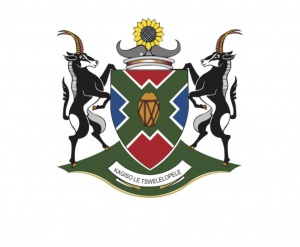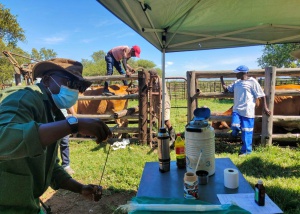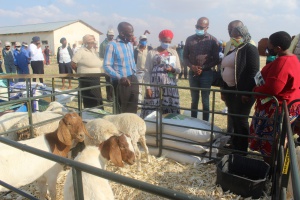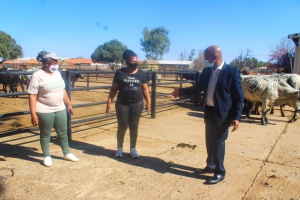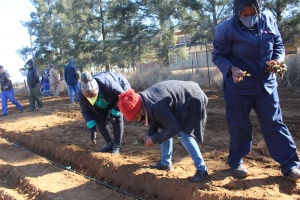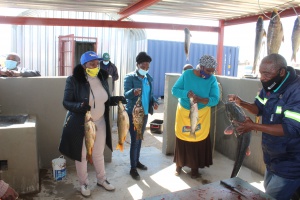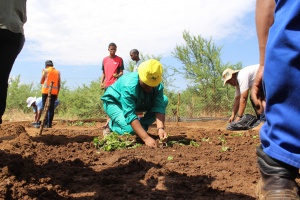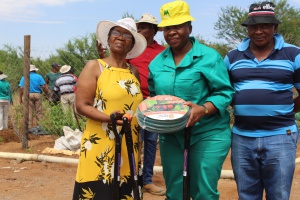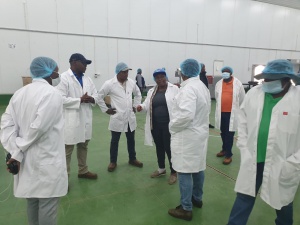MEDIA STATEMENT
Date: Sunday, 03 August 2020
North West prioritizes Food Security
The COVID-19 pandemic is a health and human crisis threatening the food security and nutrition of millions of people around the world. Hundreds of millions of people were already suffering from hunger and malnutrition before the virus hit and, unless immediate action is taken, we could see a global food emergency. According to the general household survey of 2017 the North West Province has 1, 7 million people food insecure.
In the longer term, the combined effects of COVID-19 itself, as well as corresponding mitigation measures and the emerging global recession could, without large-scale coordinated action, disrupt the functioning of food systems. Such disruption can result in consequences for health and nutrition of a severity and scale unseen for more than half a century.
The pandemic hits us at a time of immense global challenges. There is a need to tackle all the food security and nutrition dimensions of this crisis. Addressing the COVID crisis requires all of us to work together across sectors and borders both to mitigate the immediate impacts and to reshape food systems so they support healthy diets for all and do more to make food production and consumption aligned to sustainable development.
Over the years Mandela day as an initiative has been used to alleviate food security. There has been more urgent need for solidarity and concerted efforts to take action against poverty while the country and world battles with a range of injustices. It is on this basis that the department intensified its message of fighting the food insecurity during the July month and the stats below highlight the food security intervention of the week ending 31 July 2020.
To deal with the challenges facing the province of food insecure, the North West Department of Agriculture and Rural Development MEC Desbo Mohono put the Food Security programme as the number one priority.
MEC has since launched a massive provincial drive to create awareness on food security programme to enable the people in the rural areas of the North West whom are affected the most to overcome poverty and hunger also to build partnership . The department has also resolved to channel more resources towards agri-projects geared at eradicating hunger and poverty at households’ level. The aim is
“The seed has been planted,we are now begging to yield the results indeed we cannot force someone to hear a message they are not ready to receive but we must never underestimate the power planting a seed” said MEC Desbo Mohono on addressing the issue of food security.
MEC Mohono emphasis that focus should be placed on capacity building, employment creation and promoting awareness on own food production which is one way to improve food security of poor household.
The department so far reached 1974 households during the following activities:
Matlwang village near Potchefstroom: Food Security outreach programme
Identified households received goats, African chickens, Ponds, tunnel fingerlings, seedlings, solar panel.
During the World Food day celebration Ntswana le Metsing :
The focus was on sustainable projects delivered by the department as well as encouraging residents to start planting on fields that are lying fallow in order to increase food production to fight the scourge of poverty, hunger and malnutrition amongst communities.
World Food Day is an international day celebrated every year around the world on 16 October in honor of the date of the founding of the Food and Agriculture Organization of the United Nations in 1945. The day is celebrated widely by many other organizations concerned with food security, including the World Food Programme and the International Fund for Agricultural Development.
Collective action across 150 countries is what makes World Food Day one of the most celebrated days of the UN calendar. Hundreds of events and outreach activities bring together governments, businesses, NGOs, the media, and general public. They promote worldwide awareness and action for those who suffer from hunger and for the need to ensure healthy diets for all.
“It cannot be right that we are very low when we are compared with other provinces in terms of food security. We must change how we do things and have more people with access to nutritious and enough food to keep them satisfied, healthy and active”. said Mohono
“If we work together, we can build a future where we’re able to nourish to flourish as a province. Our plans are clear. We will continue with provincial interventions to assist impoverished and vulnerable people, promote the planting of household, school and community gardens,” MEC Mohono concluded.
| Establishment of Backyard Gardens |
17 vegetable gardens established |
| Distribution of Indigenous Chickens and Feed |
21 households received 20 chickens and a roaster as well a 7 bags of feed |
| Distribution of Fruit Trees |
115 households received 2 fruit trees each |
| Food Parcels |
A total of 50 food parcels were distributed to 50 households |
PHOKENG OUREACH PROGRAMME: EMPOWERING VULNERABLE GROUPS THROUGH AGRICULTURAL PROJECTS
In response to high levels of food insecurities and as part of the drive to fight poverty and hunger amongst local communities, MEC Mohono handed over garden inputs, planted various vegetable gardens and fruit trees in number of households and community centres in villages around Phokeng, Rustenburg. Held under the theme “Addressing Poverty & Malnutrition: the plight of Rural Women in Agriculture”, the aim of the project was to improve food security, up-liftment of community projects and to empower vulnerable groups to start working the land and producing food.
Ganyesa Food Security outreach Programme
100 house hold benefited from this project beneficiaries were supported with tunnels, tools, seed and fertilizer. They produce on the back yards on 10m² to 20m² for consumption and selling.
Marikana Food Security outreach programme benefits :
| DESCRIPTION |
ACTIVITIES AND SUPPORT |
| Establishment of Backyard Gardens |
Forty one (41) vegetable gardens established for households and three (3) community institutions that include a rehabilitation and disability centers |
| Distribution of Indigenous Chickens and Feed |
5 households belonging to women and older person received 10 indigenous chickens 2 bags of feed |
| Garden Tools |
41 households and the 3 institutions receive basic garden tool package |
With food security programme the department want to ensure that everyone has access to food, as it is defined by the United Nations Committee on World Food Security, that Food Security means that all people, at all times, have physical, social, and economic access to sufficient, safe, and nutritious food that meets their food preferences and dietary needs for an active and healthy life.
During the lockdown period total of 273 households were assisted with backyard gardens the number of community institutional gardens were also assisted.
ENDS.
Issued by:
Communication Services Directorate
Enquiries: Ms Emelda Setlhako
Tel: 018 389 5684/ Cell: 060 745 4020
Email: ESetlhako@nwpg.gov.za
Website:www.nwpg.gov.za/dard
Facebook:www.facebook.com/dard
Twitter: @nwpg _dard
